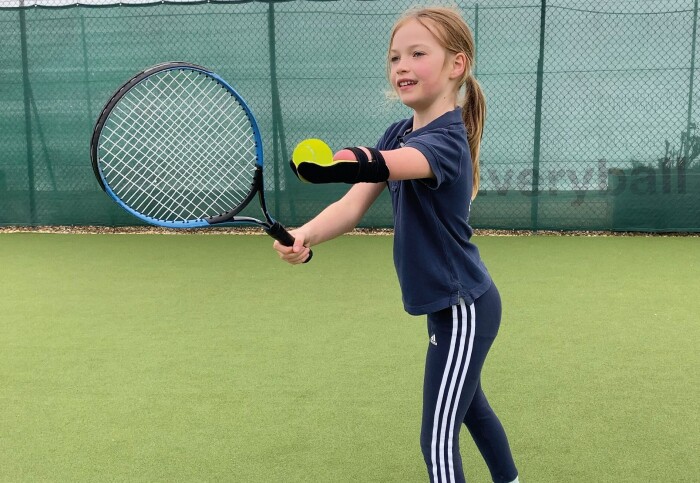Soft prosthetics startup Koalaa raises nearly £1 million from investors
by Ian Mundell

Joanie serving with her Koalaa prosthetic
The Imperial College Enterprise Fund joins investors backing Koalaa’s innovative prosthetic limbs, which are helping people worldwide.
Koalaa, a startup with its roots at Imperial, has closed a £925,000 investment round that will help drive the international expansion of its business. The company has developed a range of soft prosthetic limbs that are light, comfortable, and suitable even for very young children.
“I still find it incredible that something which started out as a spark of an idea at university has turned into a fully-fledged company, employing a team of 18 people, and with around 1,000 people worldwide now using Koalaa prosthetics,” said Nate Macabuag, the Imperial alumnus who founded Koalaa in 2020.

The idea took hold while Mr Macabaug was studying for a Master’s degree in the Department of Mechanical Engineering, and was developed with the support of Imperial’s entrepreneurship resources and programmes.
Unlike traditional prosthetics, which are made from rigid materials, Koalaa uses fabric that is breathable and fits snugly against the arm. Interchangeable tools, whose design is driven by user feedback and need, can be attached to the end of the sleeve and swapped in and out depending on the task the user would like to carry out.
Inclusive support
Koalaa’s prosthetics are already used around the world by children and adults with limb differences, including in developing and war-torn regions. With these settings in mind, the company has developed an early rehab prosthetic arm, which can be used just hours after surgery.
The other models are the ALX, for those with below-elbow limb differences; the Paww, for those with partial hands and fingers; and the Joeyy, for babies and infants.

In addition, Koalaa has developed a virtual clinic, which allows new wearers to be measured, fitted and supplied with prostheses remotely. New users are also linked with a limb buddy, who provides support every step of the way.
“Koalaa is the only company in the world making soft prosthetic arms, and we believe we have hit on a model of working that could aid inclusivity across the globe,” said Mr Macabaug.
The company is also making an impact at home. “We are already the market leader in upper limb prosthetics for children in the UK, and see huge potential to support large numbers of adults here as well. It is our hope that, one day soon, our products will be made available through the NHS.”
Investment for the future
The present funding round was led by British Design Fund, which was already an investor in Koalaa, and included a £200,000 contribution from the second Imperial College Enterprise Fund (ICEF). This was established to invest in startup and spinout companies with a strong connection to the College.
Nate and the team are a great example of the innovative startups being founded by Imperial’s community. Dr Brijesh Roy Head of Startup Investment Funds, Imperial
“Nate and the team are a great example of the innovative startups being founded by Imperial’s community,” said Dr Brijesh Roy, Head of Startup Investment Funds at Imperial. “Koalaa’s soft prosthetics are addressing an unmet need and the investment provides the financial fuel to scale this impact globally.”
The new funding will support ongoing product development, and the growth of Koalaa’s team in both the UK and overseas. It will also help expand the company’s work with clinicians and non-governmental organisations internationally, including increasing the supply of prosthetics to those within conflict zones.
Grown at Imperial
In addition to ICEF, Koalaa has benefited from a range of entrepreneurship support at Imperial. Initial designs for the prosthetics were worked out in the Advanced Hackspace, while the business took shape under the Venture Catalyst Challenge, where the project picked up a £10,000 prize. It also won £6,000 in the Institute of Global Health Innovation (IGHI) Student Challenges Competition.
Nate is a fantastic example of how Imperial’s entrepreneurship ecosystem supports founders at every stage, and how our incredible community gives back with their time, expertise and philanthropy. Victoria Nicholl Head of Incubation Services, Imperial
Further support came from the Enterprise Lab’s Experts-in-Residence programme and the Imperial Venture Mentoring Service (IVMS), and Mr Macabaug also joined an Enterprise Lab delegation to the World Economic Forum in China in 2018.
More recently he has helped other young entrepreneurs coming through the system, serving on the IVMS board for a year and joining the Imperial Entrepreneurs' Pledge. This involves a commitment to make a philanthropic gift to Imperial in the future, to support the next generation of entrepreneurs and innovators.
“Nate is a fantastic example of how Imperial’s entrepreneurship ecosystem supports founders at every stage, and how our incredible community gives back with their time, expertise and philanthropy,” said Victoria Nicholl, Head of Incubation Services at Imperial.
Images courtesy of Koalaa
Article text (excluding photos or graphics) © Imperial College London.
Photos and graphics subject to third party copyright used with permission or © Imperial College London.
Reporter
Ian Mundell
Enterprise